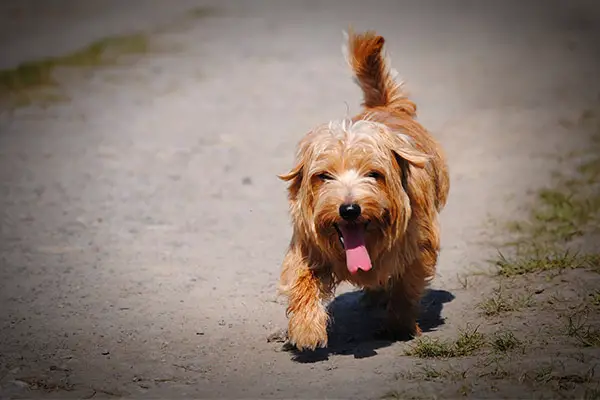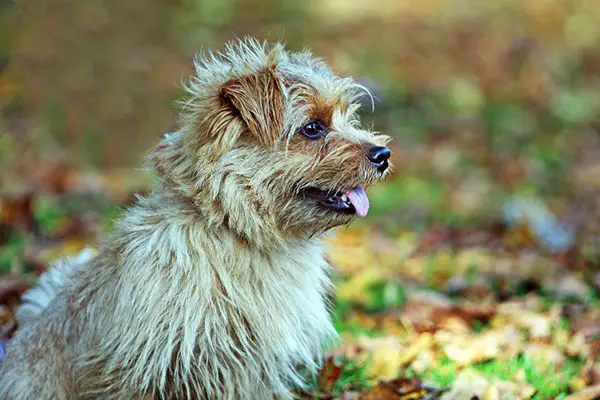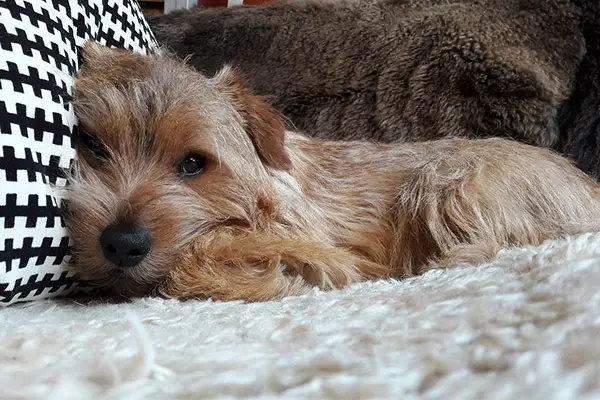Norfolk Terriers are cousins of the Norwich dog breed. Like many other terriers breeds, the Norfolk Terrier is a small dog with a big personality. These dogs are generally 10 inches in height, have long bodies, fox-like heads, and short, harsh coats.
Apart from being adorably cute, Norfolk Terriers are lively and affectionate companions. They need someone who can give them enough time and attention to keep them entertained. They can be great dogs even for first-time owners, as long as you’ll be able to cope with their crazy energy.

Norfolk Terrier Breed Statistics
| Dog Breed Group | Terrier Group |
| Breed Size | Small |
| Height | 9-10 inches |
| Weight | 11-12 pounds |
| Lifespan | 12-16 years |
Norfolk Terrier Breed Ratings
| Energy level | |
| Exercise needs | |
| Requires attention | |
| Playfulness | |
| Trainability | |
| Shedding | |
| Grooming | |
| Friendly with family | |
| Friendly with kids | |
| Friendly with strangers | |
| Friendly with other dogs | |
| Prey Drive |
Norfolk Terrier History
Norfolk Terriers originated in England along with their cousins, the Norwich Terrier. Both dogs were known as ratters and were very popular dogs with Cambridge University students around the 1880s.
Norfolk Terrier, in particular, was always recognized as the same breed as the Norwich Terrier. This is not surprising since both dogs look so much alike, aside from the fact that Norfolk Terriers have dropped ears.
It was only in 1964 that the Norfolk Terriers were finally recognized as a distinct breed by the American Kennel Club. This was then followed through by the Canadian Kennel Club in 1977.
Now, the dogs rank 126th as the most popular dog breed in the US. They are not as common as the Norwich Terriers, but one thing is for sure, these dogs make adorable and faithful companions for the right people.

Norfolk Terrier Temperament
Norfolk Terriers are generally fearless, alert, and fun-loving dogs. They are often described as full of fire and assertiveness, but they are also more companionable than other terriers.
These dogs are known to be adaptable in any living conditions as long as they are given moderate exercise. They are also very friendly and thrive on human companionship. It’s important to let them participate in family activities.
Don’t let these dogs get bored, or they may find other ways to entertain themselves. This could be in the form of digging, chewing, or excessive barking.
Norfolk Terriers will make excellent playmates for older children who know how to behave. Toddlers would need supervision. They also get along well with other pets that grew up with them.
When it comes to strangers, they can be friendly or reserved. They are also feisty with strange animals visiting their territory. It’s crucial to socialize these dogs at an early age, so they don’t become aggressive.
Early socialization will also help in making these dogs more well-rounded. Training may come easy, but it’s still important to be consistent and firm. But also make training fun and give him lots of positive reinforcements.
Norfolk Terrier Care Requirements
- Nutrition: Norfolk Terriers can eat anything as long as it’s high-quality and contains a balance of all essential nutrients. What’s vital for you to monitor is the number of calories your dog takes in a day. Small dog breeds like the Norfolk are very easy to overfeed. Be sure to ask your vet for advice regarding the number of calories you can feed them in a day. Not overfeeding them will help keep them healthy and fit. Norfolk Terriers can be fed with any diet, but remember only to buy high-quality ingredients. When feeding him dog food, buy the premium-quality ones, too, and make sure that it doesn’t contain fillers, additives, and by-products that can be harmful to your dog. You also need to be aware of any ingredients your dog may be allergic to and stay away from those.
- Grooming: Norfolk Terriers come with a double coat that sheds seasonally. Weekly brushing is essential to help remove debris and excess hair. It would also require hand-stripping, so it stays neat (you can get a professional groomer to do this). Baths can be given occasionally. Since these dogs are great indoors, they may not get messy all the time. However, be sure to clean their ears regularly. Nails should be checked and trimmed regularly as well. Long nails may cause pain and discomfort to your dog, and we don’t want that.
- Exercise: Norfolk Terriers are energetic dogs that need regular exercise. However, these activities don’t need to be heavy. You can take him out for long walks, socializing, or play games such as fetch. Just make sure to keep him on a leash when you go out. If you want to let him run around on his own, it should be in a secured fence.
- Health: Norfolk Terriers are generally healthy dogs, but it’s still important to be aware of health conditions that can affect them the most. Canine hip dysplasia, patellar luxation, and vaccination sensitivity are very common to the breed. It’s best to research the symptoms of these diseases so you can monitor your dog’s behavior. It’s highly recommended to meet at least one of your dog’s parents to be aware of any hereditary diseases your dog may get. Have your dog take some screening tests too to detect any diseases at an early age.
- Lifespan: The life expectancy of Norfolk Terriers is 12-16 years.
Famous Norfolk Terriers
- Celebre: The Norfolk Terrier who won Best in Show at Crufts 2005
Fun Facts about Norfolk Terriers
- Norfolk Terriers originated in England around the early 20th century.
- These dogs are close cousins of Norwich Terriers.
- They were developed by a man named Frank Jones.
- They were nicknamed “roughrider” because of their English Horseman reputation.
- For years, they were recognized as the same breed as the Norwich Terriers.
- You can tell a Norfolk Terrier with their dropped ears.
- The American Kennel Club recognized them as a separate breed in 1964.
Check Out Other Terrier Dog Breeds:
Airedale Terrier, American Hairless Terrier, American Staffordshire Terrier, Australian Terrier, Bedlington Terrier, Border Terrier, Bull Terrier, Cairn Terrier, Cesky Terrier, Dandie Dinmont Terriers, Glen of Imaal Terriers, Irish Terrier, Kerry Blue Terrier, Lakeland Terrier, Manchester Terrier, Miniature Bull Terrier, Miniature Schnauzer, Norwich Terrier, Parson Russell Terrier, Rat Terrier, Russell Terrier, Scottish Terrier, Sealyham Terriers, Skye Terrier, Smooth Fox Terrier, Soft Coated Wheaten Terrier, Staffordshire Bull Terrier, Welsh Terrier, West Highland White Terrier, Wire Fox Terrier

